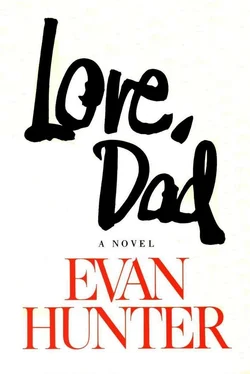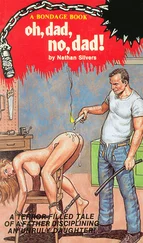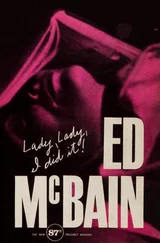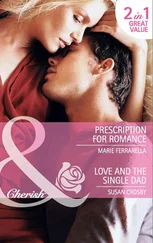As he held Joanna in his arms now, he recognized that “I love you” was only another meaningless bit of pillow talk, the puritanical way of softening the sordidness of sex, sanding down the splintery edges of lust, ridding the basic act of its raw physicality. “I love you” was the unguent of American morality, the salve which when gingerly applied beforehand or immediately afterward eased the shock of animal recognition, and thereby separated all those fornicating beasts of the field from their human counterparts. He knew she didn’t love him; she hardly even knew him.
But then he realized that in the space of — how the hell long had it been since he’d met her on the Vineyard, and who the hell cared how long it was? — in the space of that short a time, that infinitesimally brief moment in the millennium that had been his life till now, he had come to know her — all of her, Joanna La Flute, the professor, Joanna Jewish, each and every one another glittering facet of her unique and singular self — better than he’d known any woman before. Recognizing this, realizing he could never hope to pretend she was merely inconsequential, he made his decision in the form of a fervent wish: I want this to last.
But it was a decision nonetheless, conclusive and unalterable. Without surprise, and this was surprising in itself, he said, “I love you, too,” and believed (Connie notwithstanding) that this was the first time in his life he’d ever really meant the words.
Brenner University would have been a bummer except for Judd’s proximity. She called him the minute she got to school that September, at the number he’d given her for Briggs Hall, but he’d moved since and she wasn’t able to make contact till early in October. His new apartment was on Commonwealth Avenue, where he was living with another boy, who, like Judd, had just dropped out of Harvard, the school that kept you till you were eighty once they accepted you, on the assumption that the Harvard Admissions Office never made errors in judgment. The other boy’s name was Joshua Steinberg. He and Judd had lasted through two full semesters of Harvard undergraduate bullshit before deciding they were the ones who’d made the error in judgment. The boys wanted to be rock stars instead of lawyers. Judd played bass guitar and Joshua played lead. Together, they were going to set the musical world on fire.
When Lissie heard this, she immediately thought of her father, who hated rock with a passion. There were, by his exaggerated estimate, no fewer than 15,000 teenage rock groups in the town of Rutledge, Connecticut, an amazing count considering the town’s modest 17,000 population. Moreover, and still according to her father, each of these groups, like the McGruder twins, possessed $75,000 worth of electronic equipment purchased by parents who were being rendered totally deaf by the sheer decibels at any living room rehearsal. Judd and Joshua rehearsed in the living room of the Commonwealth Avenue apartment. The first time Lissie and Judd made love in Boston was during a break in rehearsals. The Beatles had just released Abbey Road and the boys were trying to learn all the songs on the album. Steinberg kept yelling through the closed bedroom door for Judd to hurry it up in there, meanwhile picking out the chords to “Come Together.”
Judd’s last name was Gordon, and the boys billed themselves as Gordon and Steinberg. He told Lissie he was of French-English extraction, the pale blue eyes and blond hair comprising the British half of his heritage, he guessed. His parents, a Dr. and Mrs. James Gordon who lived in—
“That’s my father’s name, too,” Lissie said.
“James Gordon? No kidding! We’re siblings! ” Judd said, and kissed her fleetingly on the cheek.
— a Dr. and Mrs. James Gordon who lived in Sarasota, Florida, learned in November that Judd was no longer attending classes at Harvard but was pursuing instead a musical dream of glory with a lead guitarist whose name was Joshua Steinberg. They immediately cut off all funds to him (“A total injustice,” Judd said) and told him they would not send him another penny until he began studying again at a qualified institute of higher education. Guitar lessons, they told Judd, did not in their book or on their block constitute higher education. Gordon and Steinberg were currently playing gigs in this or that Boston bar, usually for sandwiches and beer, but sometimes for three or four bucks each a night. They still had their Harvard meal tickets, which would not expire till June, and ate most of their meals at Radcliffe, where the table manners were better and the scenery more pleasant. It was Lissie who suggested that they change the name of the group—
“Do two people even qualify as a group?” she asked.
“Oh, sure. A group, sure,” Judd said.
— to Joshua and Judd, because Gordon and Steinberg sounded like a law firm. Judd thought maybe she was right, not because he thought it sounded like a law firm, but only because it was too close to Simon and Garfunkel, whom they were frankly imitating. Lissie didn’t think Gordon and Steinberg sounded the slightest bit like Simon and Garfunkel—
“You mean the way we play?”
“Well, no.”
“Then what?”
“The name.”
— but if they were considering a name change, anyway, then why not use Joshua and Judd which she thought had a nice ring to it. Judd said he would consider it, and maybe mention it to Steinberg. He told her later that he’d never considered it for more than ten seconds, and certainly had never mentioned it to Steinberg, simply because the name Joshua and Judd gave his partner top billing. When Lissie mentioned that the lead guitarist should get top billing, Judd said, “But I write all the songs.” All the songs, as it turned out, were half a dozen Judd had composed since leaving Harvard.
Safe from the draft because of a slight heart murmur, Judd had felt no qualms about dropping out of school and losing his student classification. But he identified completely with other kids his own age who were being called up every day to get themselves shot to death in some stupid fucking rice paddy. It was Judd who insisted that Lissie accompany him to Washington for the November 15 Moratorium on Vietnam. She simply went with him, not even telephoning her parents to say she’d be out of Boston that weekend. The following week, when the My Lai stories began getting full-scale treatment in all the Boston papers, Judd organized a protest outside the Mugar Memorial Library, and although only 150 students showed up to march, he felt he had focused something more than media attention on a situation of pressing moral concern to all Americans.
Most of the time, Lissie and Judd had the Commonwealth Avenue apartment to themselves because Steinberg was dating a twenty-one-year-old Catholic girl from Simmons who steadfastly refused to consummate their relationship until they got married, an unlikely prospect in that his widowed mother was an Orthodox Jew and Eileen’s parents were practicing Catholics who still refused to eat meat on Fridays, although it was now permitted by the church. Steinberg and Eileen spent a lot of time walking along the Charles together, torturing each other with a great deal of hand play.
Judd was rather a marathon lover, quick to climax (“They don’t call me Flash Gordon for nothing, lady”), but equally quick to regenerate and begin again after a bottle of beer or a cream cheese sandwich. He loved to eat in bed, and the sheets were littered with cracker crumbs and bits of cheese and salami. Since the apartment was virtually theirs to roam at will, they made love not only in the delicatessen bed, but also on the battered living room couch, and in the old-fashioned claw-footed bathtub, and once on the enamel-topped kitchen table.
Читать дальше












